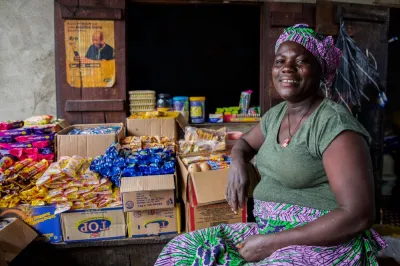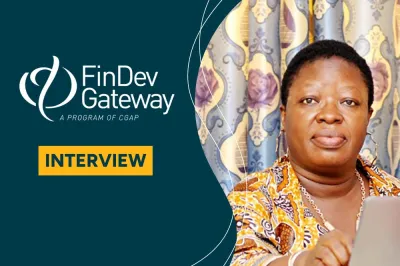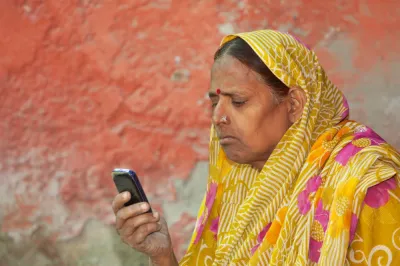Financial Inclusion and Climate Action: An Emerging Policy and Advocacy Agenda

Peter McConaghy is a Policy Advisor to Queen Máxima of the Netherlands, who is the United Nations Secretary-General's Special Advocate for Inclusive Finance for Development (UNSGSA). In this capacity, Peter provides policy and regulatory advice to deepen financial inclusion in emerging markets, with a focus on Latin America (Argentina, Mexico), Francophone West Africa and Nigeria. Peter also leads UNSGSA global engagement on inclusive green finance and women’s financial inclusion. Peter previously worked for nine years at the World Bank Group on financial sector programs in Latin America and the Middle East. He holds a master’s degree in International Economics from the Johns Hopkins University School of Advanced International Studies.
FinDev Gateway: Can you tell us a little bit about the office of the UNSGSA? What is its mission and role within the financial inclusion sector?
Peter McConaghy: Since 2009, Her Majesty Queen Máxima of the Netherlands has served as the United Nations Secretary-General’s Special Advocate for Inclusive Finance for Development (UNSGSA). The mandate of the UNSGSA is to accelerate financial inclusion for the underserved through high-level advocacy at both the global and country level, with a focus on low-income segments, women, smallholder farmers and small and medium-sized enterprises.
The UNSGSA leads policy dialogue and advocacy across 15 priority countries, and with global platforms including the G20 and the World Economic Forum. We also work with global standard-setting bodies, focusing on integrating financial inclusion as a complement to their traditional agendas around financial stability and financial integrity. Partnerships are part of our DNA within the Office of the UNSGSA, and we have a rich history of working groups that help inform global policy approaches.
Our current work includes three technical priorities: financial health, responsible and inclusive digital finance and inclusive green finance (IGF).
Focusing on climate change and financial inclusion
FinDev: What is inclusive green finance and how are you working in this area?
Peter: Over the past 12 months, the UNSGSA formed a working group to examine inclusive green finance — looking at the intersection of inclusive finance and climate resilience and adaptation, particularly at the micro level (households and SMEs). The working group has defined inclusive green finance as the following:
Access to and usage of financial services and products that build resilience to the negative impacts of climate change, loss of biodiversity and ecosystems, and facilitate participation of low-income households, small businesses, and vulnerable groups in the green and low-carbon economy.
With a small group of experts from the Alliance for Financial Inclusion (AFI), Center for Financial Inclusion (CFI) and the Sustainable Banking and Finance Network (SBFN), we recently released a publication that frames a policy and advocacy approach to this topic. This work draws on the experience of regulators within both the AFI and SBFN networks, recently released landscaping research from CFI, and technical conversations with other organizations including the Network for Greening the Financial System, CGAP, and the G20 Sustainable Finance Working Group.
FinDev: Climate change has not traditionally been a core focus for the financial inclusion sector. Why the focus now?
Peter: There are multiple important motivations for working on inclusive green finance. Here are our top three:
- Climate shocks are increasing in frequency and have a disproportionate impact on the poor. The World Bank estimates that climate change will push up to 130 million people into poverty over the next decade and could cause over 200 million people to migrate within their own countries by 2050.
- Much work on greening the financial sector has emphasized the potential financial stability risks of climate change, but there has not been as much focus on tools and pathways for microsegments, including households and small businesses, to build resilience through financial services in the face of rising climate risks.
- Of the world’s 1.4 billion unbanked adults, the majority — over 1 billion — live in the most climate-vulnerable countries. In these jurisdictions, 58 percent are not financially resilient (as compared to 25 percent in less climate-vulnerable countries and 41 percent globally).
The role for policymakers, donors and the private sector in advancing inclusive green finance
FinDev: What do you see as key starting points for policymakers and donors to advance on inclusive green finance?
Peter: There are several key ways policymakers (including regulators) and donors can get started advancing IGF. First, they can work on integrating inclusive green finance at the country level in National Financial Inclusion Strategies (NFIS) or other financial sector strategies. Examples include the NFIS of Bangladesh, Fiji and São Tomé and Principe, which now link financial inclusion and climate change, and Morocco’s National Roadmap for Aligning the Financial Sector with Sustainable Development.
They can also invest in information, data and tools. Supply- and demand-side data are important to illuminate the role of financial services in addressing climate shocks. Actions can include:
- Developing survey instruments that assess the type and frequency of climate risks facing households and MSMEs and what tools (financial and non-financial) are used to manage such risks.
- Incorporating IGF into sustainable finance taxonomies, including incorporating criteria supporting adaptation/resilience outcomes and to understand the impacts of taxonomy principles on households and SMEs.
- Investing in a research agenda that provides a deeper look at the combination of IGF interventions that can lead to more resilient communities.
- Policy design to support the integration of IGF into social protection programs.
Finally, they can integrate IGF into global and national-level regulatory frameworks. Policy dialogue is needed to advance financial sector regulatory frameworks that incorporate IGF, including with global standard-setting bodies. Also needed is a policy and research agenda which considers the potential trade-offs of climate action on inclusive finance, including adverse impacts on vulnerable groups.
FinDev: What is the role of the private sector – including banks, capital market investors, financial service providers, and fintechs – in addressing the impacts of climate change?
Peter: The role of the private sector cannot be understated. Ultimately, we need providers offering responsible financial products that increase financial resilience to climate shocks (e.g., insurance, savings for smallholder farmers, targeted credit) and provide opportunities for adaptation.
We have multiple emerging examples. In India, local organizations are providing loans to low-income women for low-cost modular roofs and heat-reflecting white paint to reduce internal temperatures during heat waves. In Ghana, where agriculture is mainly rain-based, farmers who adopted rainfall insurance increased their investment in agricultural inputs such as fertilizers, land preparation and labor.
But we need many more. This will require private sector leadership and technical analysis to build out models that serve resilience objectives but can also scale commercially. Targeted subsidies from development finance institutions and foundations will play an important role to move the market towards greater IGF solutions and develop innovative risk-sharing mechanisms such as green windows within partial credit guarantee programs.
It is time for action on the inclusive green finance agenda
FinDev: What are the next steps for the UNSGSA on this agenda?
Peter: In addition to disseminating this work at several convenings in the coming months (including the Responsible Finance Forum), the UNSGSA will work with partners to explore how best to build IGF into ongoing engagements. We will be working alongside the public and private sectors in countries to deepen IGF policy and investments.
We are looking at countries that have made substantial financial inclusion progress over the past ten years and who may be able to leverage these gains, and their supporting set of digital public infrastructure, to advance IGF. The UNSGSA will also continue to collaborate with our partners, many of whom are launching ambitious research and testing programs related to inclusive green finance. The time for action on the inclusive green finance agenda now!


